Broaden your horizons.
One of the topics I’ve presented to a few societies is “The marriage of family and local history”. By broadening our research focus to our family’s geographic context to the place(s) where they lived, we can learn so much more about their engagement with their local community and the successes and trials of that community.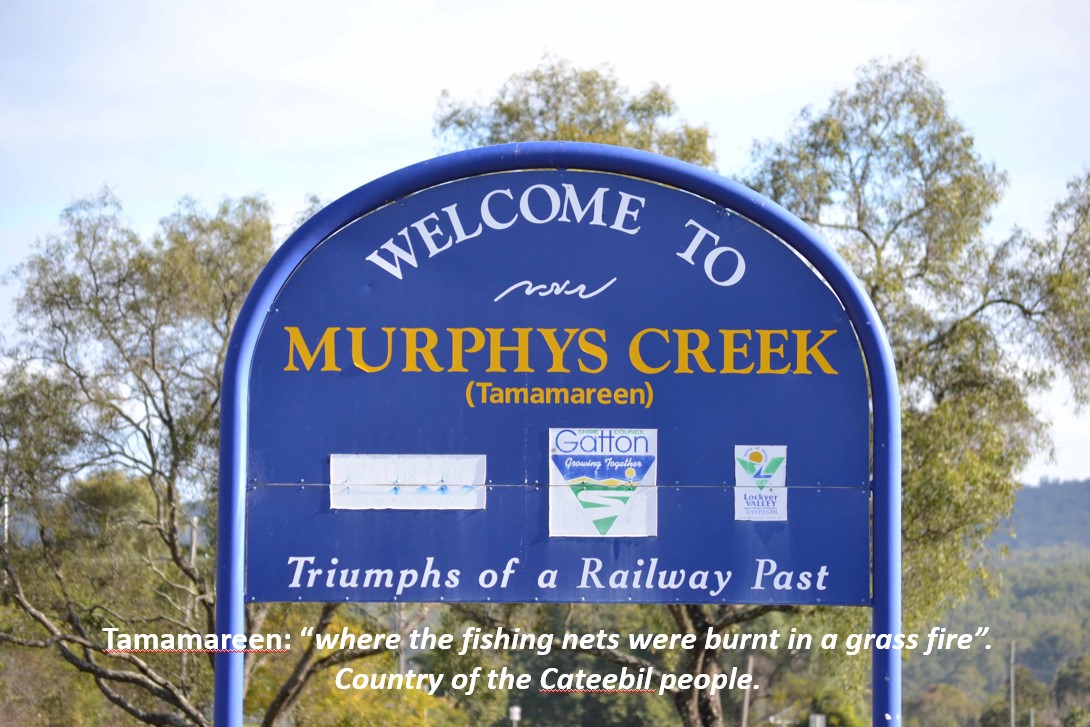
I don’t know about you, but when I drive through a small country town, I wonder how it came to be – what brought it to life, and perhaps why it’s languishing today. My case study focuses on the township of Murphys Creek below the Toowoomba range. Driving through today, you will likely form the impression it’s a quiet rural area with not much to tell us other than the railway history mentioned on the town’s welcome sign. Perhaps you would be surprised to learn the diversity of industry and activity that happened there since European settlement. When I place my Kunkel family in this context it makes them players in another story not just within their own families: how do they socialize, are they typical of the dominant religion, is their occupation typical of the region and do they succeed in particular areas?
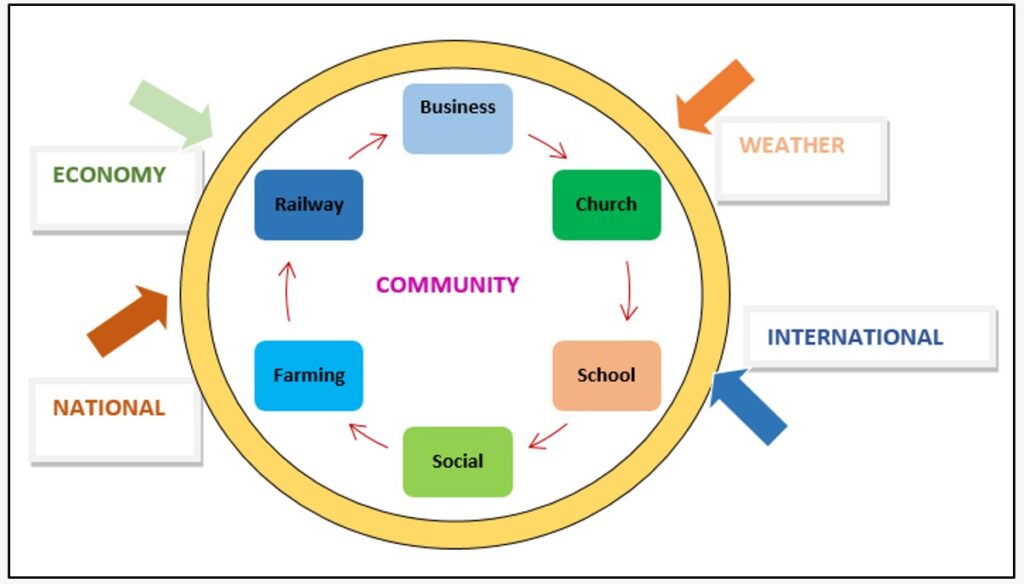
© Pauleen Cass
There are many sources we can refer to when researching both our family and the history of the place where they live, so let me share some of those which I’ve found helpful. You may have used some or many of them, but have you looked beyond your family’s name to the others mentioned?
LAND and PROPERTY
Land selection maps and associated files from the state archives can be invaluable. They will tell you who supported their selection (neighbours? friends?) You will learn what price they paid and what improvements they made in order to have their selection confirmed.
Survey maps of the area may provide information about the location of buildings which no longer exist.
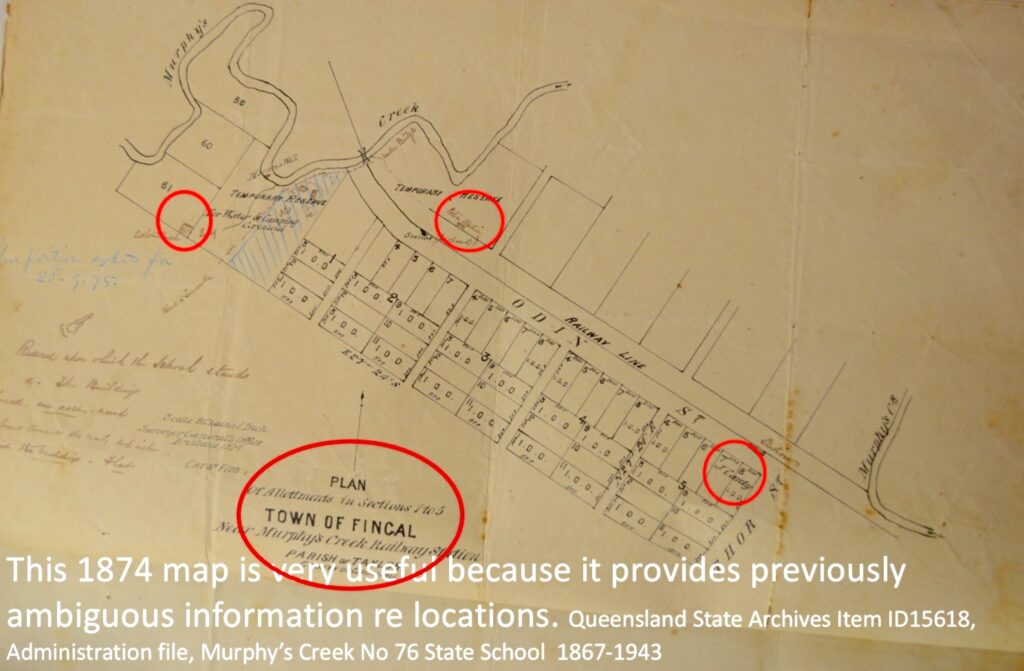
Rates notices from local council may reveal that your ancestor owned multiple properties expanding your understanding of their financial status.
Environmental surveys can offer professional expertise on the town or area even if they adjoin your specific area of interest.
Cultural surveys can sometimes be found online. Some councils have contracted them for areas you may be interested in. These can include images of the extant houses, an estimate of their age and specific features. You may find your ancestral family’s house has local significance.
INDIGENOUS HISTORY
More is being written that offers insights into the lives of Indigenous people in your area of settlement. Cultural and environmental surveys may include these as well as reference books.
RELIGION
Was there a dominant religious affiliation in your family’s area? Murphys Creek was very much a Presbyterian or non-conformist society. Roman Catholics were in a minority, even more so once the construction of the railway line to Toowoomba was completed.
Who might hold the relevant records for your family’s religion? For example, Toowoomba Local History library holds the Presbyterian communion rolls for Murphys Creek. Diocesan archives for the Catholic church may be able to assist. Just remember to pay your way when seeking help from organisations for whom your family history is not a key priority.
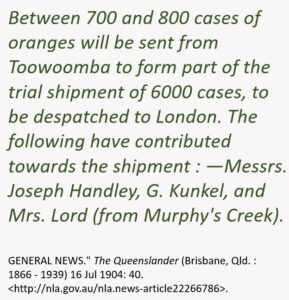 INDUSTRIES and BUSINESS
INDUSTRIES and BUSINESS
While I knew that Murphys Creek was known for its quality sandstone and the railway, I had no idea of the diversity of industry and business that were active in its earlier days: mining, timber getting, butcheries, and of course, multiple pubs. Trove is a gold mine in finding out these activities – search by the place name and you might like to start a list by the place name.
Where did your family’s work activities fit into the scheme of things? I had been told the Kunkel family had orchards and vineyards, but this advertisement put it in a wider context.
LOCAL and ORAL HISTORIES
Unfortunately, the ship has sailed for first person experiences in oral histories of the early days. I was very fortunate to have two invaluable contacts in this area to help me expand my understanding and knowledge.
Back in 1988 I was able to interview the granddaughter who had lived with my ancestral Kunkel family in Murphys Creek, and Annie provided me with excellent and verifiable information on the family. Interestingly, when she was interviewed by Cameron McKee, a knowledgeable local historian, she mentioned new information about George Kunkel but also talked about social life in the early 20th century. Cameron also generously shared a great deal of information on the Murphys Creek area with me.
One caution – local history books can be extremely helpful, but you also need to be discerning about the source of information and whether a broad range of people have been consulted.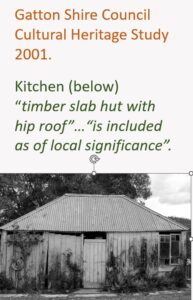
Also search your state reference library for photos as well as doing an internet search.
EDUCATION
Was there a school in your town of interest? When did it commence? Might your ancestor have been one of those who applied to establish a provisional school?
Check out what Queensland State Archives holds on this school. Look beyond your own family’s name to see which other families were there at the time. Read the administrative files as well.
NEWSPAPERS
I hardly even need to mention these as Trove is one of the first places we turn for research. Check whether there’s a newspaper that may not have been digitized yet. And count your blessings if you find a paper that includes all sorts of “trivial” news – who broke their elbow etc. They’re also excellent for discovering the social and community life of the town.
Try searching by your place and “subscriptions” or “donations” as it’s surprising what turns up – 19th century Go Fund me donations, church establishment, hospital support etc etc.
WIDER PATHWAYS
Look beyond your place of interest to the towns around it.
Where might people have retired when their farms became too difficult to manage?
Where was the nearest hospital and the optimal access route? This may account for their burial in a different place.
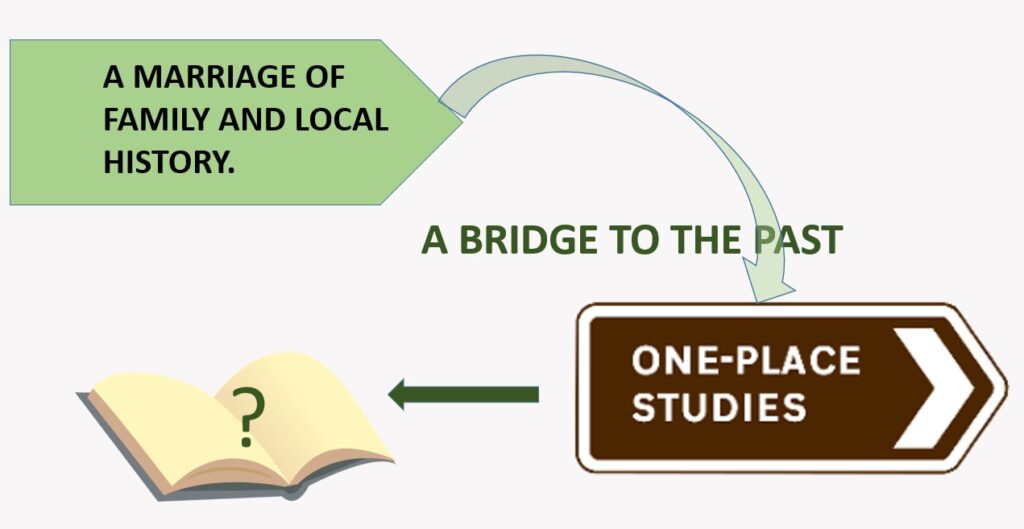 ONE PLACE STUDIES
ONE PLACE STUDIES
The broadening of your research to include wider local history may lead you to a One Place Study. If you’re so inclined you may wish to view at least some of the short video presentations on the All About That Place link. Some of the videos will expire on 20 October but others will remain available beyond that.
I hope you have fun exploring some of these options in your research and wish you happy hunting.

Thanks Pauleen. A great reminder to think broad and wide as we piece together the lives of our ancestors. And yes, TROVE is a never ending source of fascinating information.
Thanks for commenting Andrew. Trove had revealed so much of the lives of our ancestors’ daily lives..
Pauleen, thank you for providing so many more ideas to expand our research efforts beyond the person or family. By encouraging us to look at the community and the place more broadly, you have super-charged my efforts in researching the Barlow, Lambert, Jones and Brown ancestors of my late wife. These have been the subjects of my blogs but lately, I felt I was losing my enthusiasm. Thank you for the stimulus.
Glad it was a help. Sometimes we just need a little inspiration.hapoy hunting!